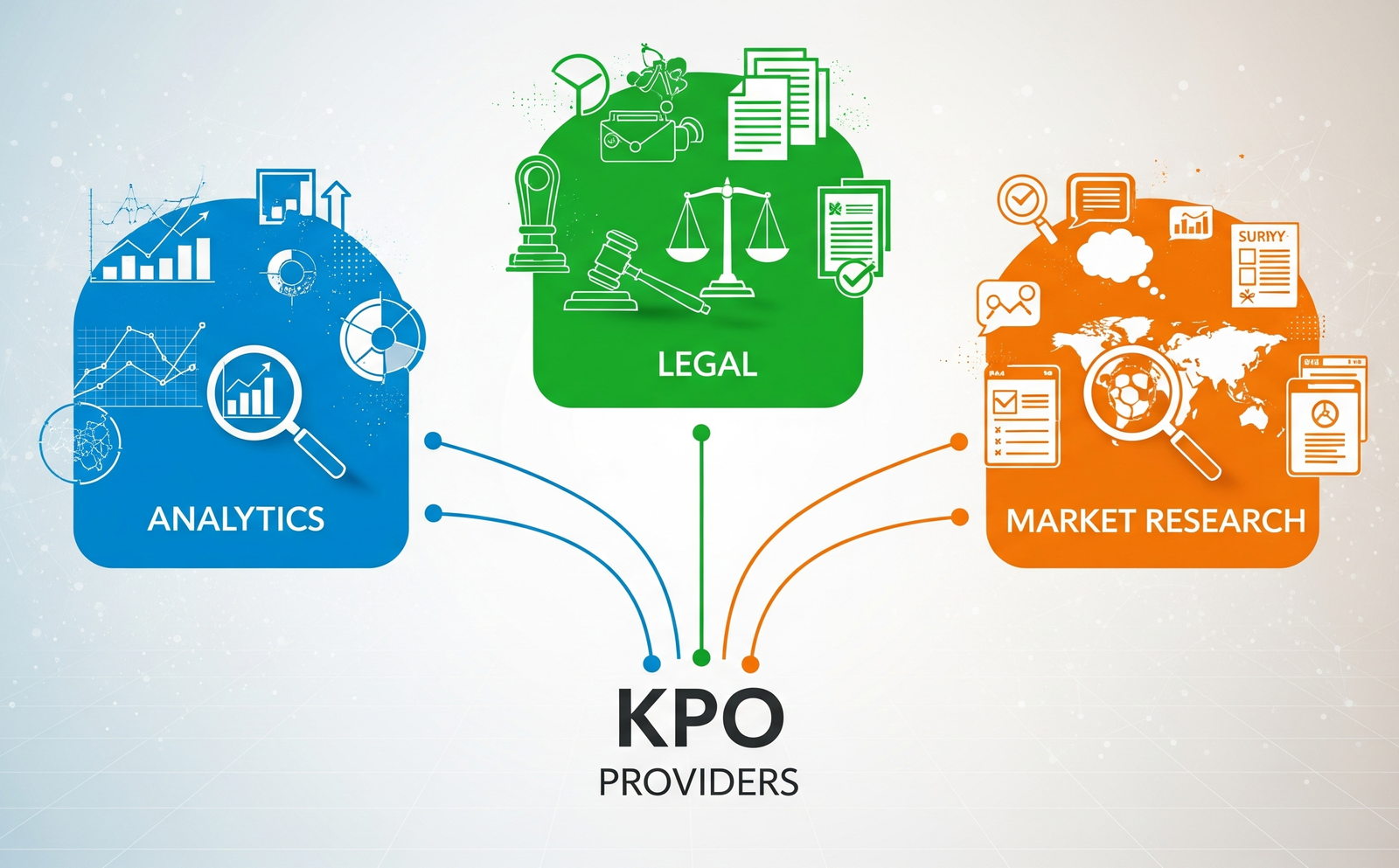Introduction
KPO Services-In the competitive economy of today, companies depend not only on efficiency but on knowledge and expertise to remain in the lead. This is where KPO Services (Knowledge Process Outsourcing Services) are needed. While BPO (Business Process Outsourcing) involves working with mundane tasks, KPO involves high-value, knowledge-based processes like data analytics, legal research, and market intelligence. Leading KPO providers provide specialized skills that help companies save costs, scale more quickly, and make informed decisions. From start-ups to multi-nationals, organizations are increasingly relying on these services to gain a competitive edge in a globalized market.
What Are KPO Services?
KPO Services involve outsourcing tasks that require advanced knowledge and analytical capabilities. These include:
- Analytics – Data mining, predictive modeling, business intelligence dashboards, customer insights, and risk management.
- Legal – Contract drafting, intellectual property (IP) research, compliance monitoring, and litigation support.
- Market Research – Consumer behavior studies, competitor benchmarking, industry trend analysis, and market entry strategies.
Unlike BPO, which handles standardized processes, KPO delivers customized, expertise-driven solutions that directly impact business strategies.
Scope of KPO in Analytics, Legal, and Market Research
1. Analytics KPO
Businesses generate vast volumes of data daily. Analytics KPO providers help organizations turn raw data into actionable insights through predictive analytics, big data analysis, and business intelligence tools. Industries like retail, banking, healthcare, telecom, and manufacturing rely heavily on these services to improve customer experiences, detect risks, and optimize operations.
2. Legal KPO
Legal outsourcing has become a game-changer for law firms and corporations. Services include contract drafting, IP management, compliance support, and litigation research. With legal costs soaring in the US and Europe, outsourcing to countries like India and the Philippines ensures high-quality legal expertise at affordable rates.
3. Market Research KPO
Before entering new markets or launching products, companies need accurate insights. Market research KPO services provide competitor analysis, consumer surveys, trend forecasting, and industry reports. This empowers organizations to minimize risks and seize opportunities faster. Sectors like FMCG, tech, and healthcare are among the biggest users of market research KPO.
Top Global KPO Providers
- Genpact – Known for analytics and business insights, serving Fortune 500 clients.
- WNS Global – Strong in finance, analytics, and market research.
- Evalueserve – Specializes in research-driven KPO, including financial and legal services.
- Infosys KPO – Provides analytics, legal, and engineering design support.
- Accenture – Offers global-scale KPO across analytics, compliance, and consulting.
- Integreon – A leader in legal KPO and compliance solutions.
- Pangea3 (Thomson Reuters) – Known for IP research and litigation support.
- Ugam (a Merkle Company) – Focuses on analytics and market intelligence.
These providers combine global talent, advanced technologies, and domain expertise to help businesses thrive.
Benefits of KPO Services
- Cost Savings – Accessing skilled professionals at lower costs compared to in-house teams.
- Specialized Expertise – Domain experts in law, analytics, and research ensure accuracy and efficiency.
- Faster Decision-Making – Data-driven insights improve strategic choices.
- Focus on Core Business – Companies can prioritize innovation while outsourcing knowledge-heavy processes.
- Scalability – Flexible outsourcing models let organizations scale up or down based on demand.
Challenges in KPO Services
- Data Security Risks – Sensitive financial or legal data must be protected.
- Quality Control – Maintaining high standards across different geographies can be challenging.
- Cultural & Communication Barriers – Time zones and language differences sometimes slow collaboration.
- Dependence on Outsourcing Partners – Over-reliance may affect long-term strategy if not managed properly.
Future of KPO Services
The future of KPO Services is being shaped by AI, automation, and big data. Advanced tools will enhance predictive modeling, legal compliance checks, and real-time market intelligence. Countries like India, the Philippines, and Eastern Europe will continue to dominate as global KPO hubs due to their skilled workforce and cost advantages.
Additionally, the rise of Knowledge + Intelligence Process Outsourcing (KIPO)—a fusion of human expertise and AI-driven automation—will redefine how businesses use outsourced intelligence.
Conclusion
KPO Analytics, legal, and market research services are now a must-have for contemporary businesses. Leaders such as Genpact, WNS Global, Infosys, and Integreon equip firms with strategic insights, compliance assistance, and market intelligence that fuel growth and competitiveness. As businesses grow more data-centric, outsourcing to trusted KPO partners will continue to be one of the wisest investments for companies in pursuit of innovation, efficiency, and sustainable success.


